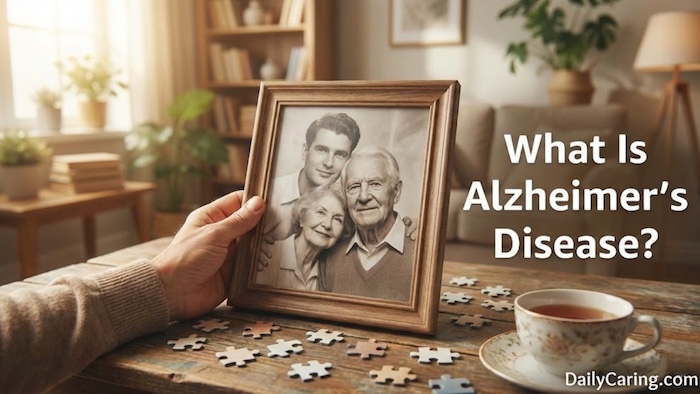Watching a loved one with dementia become suddenly angry, combative, or agitated can be heartbreaking and overwhelming. Aggressive behaviors like yelling, hitting, or refusing care often stem from fear, confusion, or an unmet need that they can no longer express.
While these outbursts are among the most challenging aspects of dementia care, there are proven ways to prevent, de-escalate, and respond with compassion.
This article shares 14 practical strategies dementia specialists use, from identifying hidden triggers to creating a calming environment. Remember, connection is possible, even in difficult moments.

10 Tips for Dealing With Aggressive Behaviors in Dementia
1. Be prepared with realistic expectations
Reminding yourself that challenging behavior and aggressive outbursts are typical symptoms of dementia helps you respond in a calm and supportive way.
Knowing that these episodes are a standard part of the disease reduces your shock and surprise when it does happen and may also make it a little easier not to take the behavior personally.
2. Try to identify the immediate cause or trigger
Think about what happened just before the aggressive outburst started. Something like fear, frustration, or pain might have triggered it.
For example, your older adult might start yelling at empty areas of the room and telling people to get out. You might notice the room getting darker because it’s early evening. The dim light creates shadowing in the room's corners, making it seem like people are there.
After identifying that potential trigger, turn on the lights to eliminate the shadowy corners. That will hopefully help you, older adult, calm down. And, in the future, you’ll know to turn on the lights before the room gets too dim.
In another example, you might have unintentionally approached your older adult from behind, startling them. In a sensitive moment, they could feel attacked, so they lash out in what they perceive as self-defense.
3. Rule out pain as the cause of the behavior
Pain and physical discomfort can trigger aggressive behavior in someone with dementia.
Many older adults with dementia aren’t able to communicate when something is bothering them. Instead, being in pain or discomfort could cause them to act out.
Check whether they need pain medication for existing conditions like arthritis or gout, whether their seat is comfortable, and whether they need to use the toilet.
4. Use a gentle tone and reassuring touch
When your older adult gets upset, take a deep breath and stay as calm as possible. If you’re upset, it unintentionally escalates the tension in the situation.
Staying calm and breathing slowly helps to reduce everyone’s anger and agitation. Speak slowly and keep your voice soft, reassuring, and positive.
Use a gentle and calming touch on the arm or shoulder to provide comfort and reassurance.
5. Validate their feelings
If your older adult is aggressive and there isn’t an apparent cause, it could be because they’re having strong negative feelings like frustration, sadness, or loneliness, and don’t know how to express themselves adequately.
Look for clues to their emotions in their behavior and speak calmly and comfortingly. Reassure them that it’s okay to feel that way and that you’re there to help.
6. Calm the environment
A noisy or busy environment could also trigger aggressive dementia behavior.
If your older adult starts behaving aggressively, notice the environment to see if you can quickly calm the room. Turn the music volume down or off, and consider asking others to leave the room.
7. Play their favorite music
Music has an amazing effect on mood.
Sometimes, singing an old favorite song, humming a soothing tune, softly playing relaxing classical music, or playing their favorite sing-along tunes can quickly calm someone down.
8. Shift focus to a different activity
If the current or previous activity caused agitation or frustration, it could have provoked an aggressive response.
After giving your older adult a minute to vent their feelings, try to shift their attention to a different activity – something they typically enjoy.
9. Remove yourself from the room
In some cases, nothing works to calm the person.
If that happens, it may be best to leave the room to give them some space and yourself time to calm down and regain your balance. They may be able to calm themselves or even forget they’re angry.
Before leaving, check that the environment is safe and that the children are unlikely to hurt themselves while you’re gone.
10. Make sure you and your loved one are safe, and call for help in emergencies
If your older adult can’t calm down and is becoming a danger to you or themselves, you’ll need help from others.
If the situation isn’t extreme and there’s a nearby family member or friend that your older adult usually responds well to, call and ask them to come over to help immediately.
In an emergency, call 911 and emphasize to the operator that the person has dementia, which is causing them to act aggressively. This helps first responders know that the person isn’t behaving criminally and needs help to calm down safely.
When first responders arrive, make sure you clearly state that this behavior is caused by dementia or even “a brain injury” (in case they’re not familiar with dementia). That knowledge helps first responders treat them more appropriately.
If an older adult needs to be removed from the home, ask them to be taken to a hospital or psychiatric institution rather than a police station.
Assuming that you don’t want to press charges, make it very clear that this behavior is caused by dementia (or “mental illness” – might be easier to understand) and not criminal behavior. That helps avoid formal charges or unwanted court proceedings.
Use Calming Techniques to De-Escalate Aggressive Dementia Behaviors
Some people with Alzheimer’s disease or dementia may enter a combative stage of dementia.
This is a regular part of the disease caused by damage to the brain.
It can happen even if your older adult’s typical personality has been kind and non-violent throughout their lives.
Because they’re not able to communicate their needs, people with dementia may lash out when they’re afraid, frustrated, angry, or in pain or discomfort.
These aggressive outbursts can be scary and difficult for caregivers to handle. Older adults could scream, curse, bite, grab, hit, kick, push, or throw things.
Since you feel attacked, your instincts might prompt you to argue and fight back, but that only worsens the situation.
We share 10 tips for dealing with aggressive behavior in dementia while it’s happening. We also explain four ways to learn from the situation and prevent or reduce future outbursts.
4 things to do After Dealing with Aggressive Behaviors
1. Learn from what happened
After giving yourself a chance to calm down and de-stress from the episode of aggressive dementia behavior, take a step back to see what you can learn from the situation.
Analyzing the situation also helps you take it a little less personally and makes it easier to think about what you could do differently next time to try to avoid an aggressive reaction.
Think about possible triggers, which responses helped calm things down, and which responses seemed to make the situation worse.
It often helps to take notes on your observations to spot patterns and find new ways to prevent a similar outburst in the future, or to cool things down if one does happen.
2. Find sources of support
Your well-being needs to talk with people who understand and can help you cope with these challenging situations and conflicting emotions.
Share your experiences with members of a caregiver support group, a counselor or therapist, or with supportive friends or family members.
Getting your feelings out is an essential outlet for stress. Plus, you might get additional tips and ideas for managing aggressive dementia behavior from others who have dealt with it.
3. Consider medication
When non-drug techniques aren't working and challenging behaviors become too much to handle safely, it might be time to work with their doctor to experiment with behavioral medications carefully.
When used appropriately, medication can curb dangerous aggression and improve the quality of life for your older adult and yourself.
4. Consider moving your older adult to a memory care community
If the aggressive behavior in dementia continues to be dangerous and no interventions are working, it may be time to consider moving them to a memory care community.
A specialized care community can be helpful because multiple staff members are on duty 24/7, there is 24/7 supervision and care, and the staff is trained to handle these difficult situations.
Next Steps: Get 7 ways to reduce and prepare for aggressive dementia behaviors
Recommended for you:
- Dementia and Anger: 9 Calming Strategies
- How to Understand and Manage Dementia Behaviors: A Comprehensive Guide
- 7 Ways to Reduce Aggressive Dementia Behaviors
About the Author

Connie is the founder of DailyCaring.com and was a hands-on caregiver for her grandmother for 20 years. (Grandma made it to 101 years old!) She knows how challenging, overwhelming, and all-consuming caring for an older adult can be. She also understands the importance of support, especially in the form of practical solutions, valuable resources, and self-care tips.














My mom is being abused by her dementia with violence husband. He turns it on and off when police or potential aid comes. He refuses any help she manages to get and is paranoid /delusional/persistantly hostile & increasingly violent. His family is non cooperative getting my mom in home help to manage him. He is non cooperative. Dementia runs in their family , but she lives in a very small town and no one does anything! We are worried for her safety daily! She is in another state and he is triggered by company when we manage to visit to help . My mom is an abused slave and has no personal time nor help. Please advise. I called elder abuse to no avail. What can we do to protect her ( and him?) he could injure her or worse …
We’re so sorry to hear that this has been happening. Since he refuses any home care help (and sounds like he’s refusing medical care as well), it sounds like the only safe option is to get one of them out of the house – either move your mom out or move her husband into assisted living (memory care).
My mom is being abused by her dementia with violence husband. He turns it on and off when police or potential aid comes. He refuses any help she manages to get and is paranoid /delusional/persistantly hostile & increasingly violent. His family is non cooperative getting my mom in home help to manage him. He is non cooperative. Dementia runs in their family , but she lives in a very small town and no one does anything! We are worried for her safety daily! She is in another state and he is triggered by company when we manage to visit to help . My mom is an abused slave and has no personal time nor help. Please advise. I called elder abuse to no avail. What can we do to protect her ( and him?) he could injure her or worse …
The problem is changing a parent’s diaper. I have identified the source of their angry reaction, but I still have to change the diaper multiple times a day. How do you deal with that, and make it less scary or less humiliating for them? Just pulling the pants down is aggravating enough, and I am trying to convince mom to start wearing long skirts, but then I would have to lift that long skirt, which is upsetting as well. Then the issue of cleaning or trimming nails comes up, which is never easy. Other than that, she functions well. It is just very hard for her to be handled for any issue related to cleanliness or diaper changing.
It’s great that you’ve found the trigger for her reaction and behavior. It’s possible that your mom feels attacked or that her privacy is being invaded since these are personal care tasks.
These videos from leading dementia educator Teepa Snow might be helpful:
– https://www.youtube.com/watch?v=VDxBCb2-k1g
– https://www.youtube.com/watch?v=iKT9YIVPREE
We’ve also got an article that describes a situation similar to the one you’re describing. That video is no longer available, but the written explanations may still be helpful – How to Reduce Resistance to Care in Dementia: An Expert Demonstrates https://dailycaring.com/how-to-reduce-resistance-to-care-in-dementia-an-expert-demonstrates-video/
Excellent tips . . .…
Thank you for sharing .
You’re welcome! So glad this article is helpful.
I have a dementia client who die speak clearly and today he told me to get out of his house. When it was time for me to leave his wife was trying to open the door (she has to keep it lock) she asked him to move so I could leave once I passed him he pushed me and told me to leave. This is my 2nd day on the job. What advice can you give me.
When someone has dementia, they often won’t be able to accurately communicate their thoughts and often aren’t able to make good decisions so try not to take this client’s words too personally.
They may need more time to get used to having you around and may feel temporarily uncomfortable since you’re still a stranger to them. Give it some time, be patient and kind, and hopefully he will start to become more comfortable with you soon.
We’ve got plenty of tips on how to manage various dementia behaviors here – https://dailycaring.com/tag/challenging-dementia-behaviors/
My husband and I have been married 40 years. He has ssd’s been an alcholic since I met him. He has been known to be physically and extremely ment as lly abusive. I have tried to commit suicide so many times I can’t remember. That was 18 years ago as nd God helped me and I never had a thought since. Lately he seems to drink less and act worse. He has high blood pressure and in the past week, I have had thoughts of suicide because he says the worst things to me, that hurts more than a beating. I can’t stay here much longer, IM on SSDA and get 680 a month. I have no place to go and need help .my health is bad at times and an abuse shelter wouldn’t work cause sometimes I have to be alone. I need a place with my own room. I have an old shitzue that I cant leave behind. Please help me.
So sorry to hear about your situation. It’s essential that you keep yourself safe. Though it’s not the ideal solution, it may be best for you to go to a shelter so you can be safe while you figure out your next steps.
Thanks for the great tips..been thrown in the deep end re aggressive behaviour from man with dementia
So sorry to hear that you’re dealing with aggressive behavior. We hope these suggestions will help the situation.
This is a response to your article on dealing with aggression in dementia. I have my wife (88) in a locked Memory Care unit (3 yrs) as she has suffered from AD for 12 years.
Perhaps the WORST part of a MCU is the other residents. All residents are negatively affected by the one who screams, fights or otherwise is difficult. A MCU may be good for the caregiver, but can be terrible for the patient, particularly if the Staff is poor and the facility treats patients as prisoners.
What’s the answer? Unfortunately I don’t know. My wife wanders and so must be confined. In any other situation, I’d keep her at home and use a homecare service.
So sorry to hear that this is happening! When some residents are aggressive, it certainly creates an unpleasant situation for the other residents, especially when the staff aren’t able to handle the outbursts well. Unfortunately, there isn’t a great solution since it’s important for your wife to be in a place that’s able to keep her safe by preventing her from leaving.
Perhaps repeatedly speaking with the administration could help improve the situation. Or, you could report this to the local ombudsman’s office to see if they can provide assistance or advice. More info on that here — Nursing Home Complaints? The Ombudsman Is on Your Side https://dailycaring.com/nursing-home-complaints-the-ombudsman-is-on-your-side/